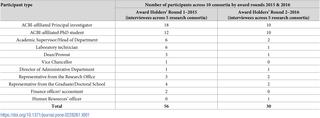Our official English website, www.x-mol.net, welcomes your
feedback! (Note: you will need to create a separate account there.)
Strengthening capacity for natural sciences research: A qualitative assessment to identify good practices, capacity gaps and investment priorities in African research institutions.
PLOS ONE ( IF 2.9 ) Pub Date : 2020-01-24 , DOI: 10.1371/journal.pone.0228261 Taghreed El Hajj 1 , Stefanie Gregorius 2 , Justin Pulford 1 , Imelda Bates 1
PLOS ONE ( IF 2.9 ) Pub Date : 2020-01-24 , DOI: 10.1371/journal.pone.0228261 Taghreed El Hajj 1 , Stefanie Gregorius 2 , Justin Pulford 1 , Imelda Bates 1
Affiliation

|
BACKGROUND
Strengthening research capacity in low-and-middle-income countries is essential to drive socioeconomic development and to achieve the Sustainable Development Goals. Understanding strengths and weaknesses in institutions' research capacity can guide effective targeting of investments and resources. This study assessed the capacity of institutions undertaking research in natural science topics in Africa to identify priority capacity gaps for future investment.
METHODS
Assessments were conducted in eight African institutions that were partners in a UK-Africa programme to strengthen research capacity in renewable energy, soil-related science, and water and sanitation. Assessments involved eighty-six interviews and three focus group discussions to identify institutions' research capacity strengths and gaps against an evidence-informed benchmark. Use of the same interview guides and data collection processes across all institutions meant that findings could be compared.
RESULTS
Common research capacity gaps were: lack of, or poorly maintained, equipment; unreliable, slow procurement systems; insufficient opportunities for developing the skills of research support staff such as administrators and technicians; dysfunctional institutional email communication systems; insufficient focus on the development of 'soft' researcher skills such as ethics, academic writing and, in non-Anglophone countries, English language. Programme strengths were the South-South and South-North partnerships for sharing and cascading expertise and resources, joint writing of proposals and publications, and improved individual and institutional visibility.
CONCLUSION
There were many similarities in research capacity gaps irrespective of the institutions' natural sciences research focus, and these were similar to those reported in the health sector. Common capacity needs are improving the skills of technicians and administrators to support research activities, soft skills training for researchers, and more effective pan-institutional e-communication systems. These could be strategic investment targets for the joint efforts of national governments and international organisations that fund programmes for strengthening research capacity in low- and middle-income countries.
中文翻译:

加强自然科学研究的能力:定性评估,以确定非洲研究机构的良好做法,能力差距和投资重点。
背景技术加强中低收入国家的研究能力对于推动社会经济发展和实现可持续发展目标至关重要。了解机构研究能力的优势和劣势可以指导有效瞄准投资和资源。这项研究评估了在非洲从事自然科学主题研究的机构的能力,以确定未来投资的优先能力差距。方法在与英国-非洲计划合作的八个非洲机构中进行了评估,以加强在可再生能源,与土壤相关的科学以及水和卫生设施方面的研究能力。评估涉及86次访谈和3次焦点小组讨论,以确定机构的 研究能力的优势和与循证基准相比的差距。在所有机构中使用相同的采访指南和数据收集过程意味着可以对调查结果进行比较。结果常见的研究能力差距是:缺少设备或维护不善;不可靠,缓慢的采购系统;没有足够的机会发展研究支持人员(例如管理员和技术人员)的技能;机构电子邮件通讯系统功能失调;缺乏对“软”研究者技能的开发的重视,例如道德,学术写作,以及在非英语国家的英语。计划的优势是南南和南北伙伴关系,以共享和层叠专业知识和资源,共同撰写提案和出版物,并提高了个人和机构的知名度。结论无论机构的自然科学研究重点如何,研究能力的差距有很多相似之处,并且与卫生部门报告的相似。共同能力的需求是提高技术人员和管理人员的技能以支持研究活动,对研究人员进行软技能培训以及更有效的泛机构电子通信系统。这些可能是国家政府和国际组织共同努力的战略投资目标,这些政府为加强中低收入国家研究能力的计划提供资金。这些与卫生部门报道的情况相似。共同能力的需求是提高技术人员和管理人员的技能以支持研究活动,对研究人员进行软技能培训以及更有效的泛机构电子通信系统。这些可能是国家政府和国际组织共同努力的战略投资目标,这些政府为加强中低收入国家研究能力的计划提供资金。这些与卫生部门报道的情况相似。共同能力的需求是提高技术人员和管理人员的技能以支持研究活动,对研究人员进行软技能培训以及更有效的泛机构电子通信系统。这些可能是国家政府和国际组织共同努力的战略投资目标,这些政府为加强中低收入国家研究能力的计划提供资金。
更新日期:2020-01-26
中文翻译:

加强自然科学研究的能力:定性评估,以确定非洲研究机构的良好做法,能力差距和投资重点。
背景技术加强中低收入国家的研究能力对于推动社会经济发展和实现可持续发展目标至关重要。了解机构研究能力的优势和劣势可以指导有效瞄准投资和资源。这项研究评估了在非洲从事自然科学主题研究的机构的能力,以确定未来投资的优先能力差距。方法在与英国-非洲计划合作的八个非洲机构中进行了评估,以加强在可再生能源,与土壤相关的科学以及水和卫生设施方面的研究能力。评估涉及86次访谈和3次焦点小组讨论,以确定机构的 研究能力的优势和与循证基准相比的差距。在所有机构中使用相同的采访指南和数据收集过程意味着可以对调查结果进行比较。结果常见的研究能力差距是:缺少设备或维护不善;不可靠,缓慢的采购系统;没有足够的机会发展研究支持人员(例如管理员和技术人员)的技能;机构电子邮件通讯系统功能失调;缺乏对“软”研究者技能的开发的重视,例如道德,学术写作,以及在非英语国家的英语。计划的优势是南南和南北伙伴关系,以共享和层叠专业知识和资源,共同撰写提案和出版物,并提高了个人和机构的知名度。结论无论机构的自然科学研究重点如何,研究能力的差距有很多相似之处,并且与卫生部门报告的相似。共同能力的需求是提高技术人员和管理人员的技能以支持研究活动,对研究人员进行软技能培训以及更有效的泛机构电子通信系统。这些可能是国家政府和国际组织共同努力的战略投资目标,这些政府为加强中低收入国家研究能力的计划提供资金。这些与卫生部门报道的情况相似。共同能力的需求是提高技术人员和管理人员的技能以支持研究活动,对研究人员进行软技能培训以及更有效的泛机构电子通信系统。这些可能是国家政府和国际组织共同努力的战略投资目标,这些政府为加强中低收入国家研究能力的计划提供资金。这些与卫生部门报道的情况相似。共同能力的需求是提高技术人员和管理人员的技能以支持研究活动,对研究人员进行软技能培训以及更有效的泛机构电子通信系统。这些可能是国家政府和国际组织共同努力的战略投资目标,这些政府为加强中低收入国家研究能力的计划提供资金。











































 京公网安备 11010802027423号
京公网安备 11010802027423号